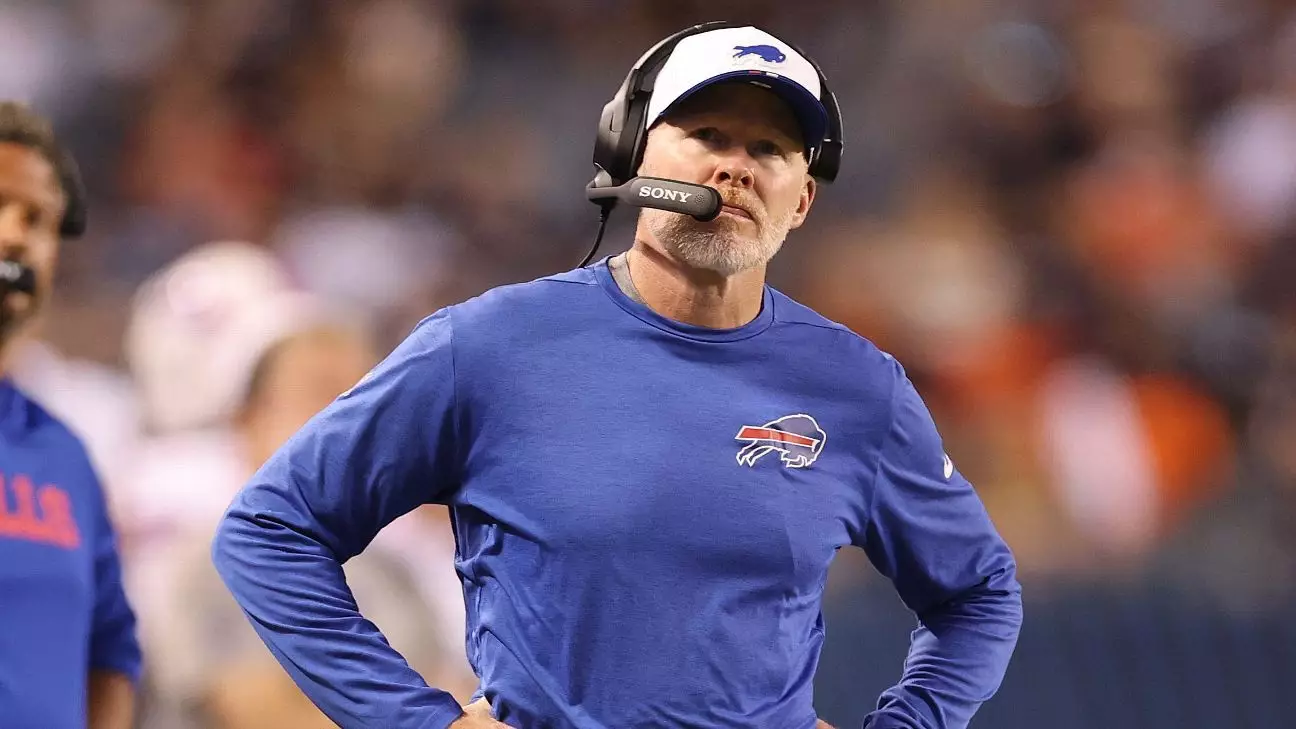The recent defeat of the Buffalo Bills against the Chicago Bears was not merely a loss; it was a stark wake-up call exposing the deep-rooted flaws within the team’s current setup. The 38-0 blowout was a reflection of deficiencies that cannot be dismissed as mere preseason jitters. Coach Sean McDermott’s candid admissions about the team’s performance underscore a growing concern that this squad is far from ready for the demands of the upcoming season. The relentless outgaining of 528-180 yards, coupled with a pervasive sense of underperformance, paints a portrait of a team struggling to come together. There appears to be a chasm between expectations and reality — one that demands serious introspection and transformative action.
A significant aspect of this loss was the lack of cohesion and execution, even among personnel considered to be the team’s strength. The fact that even the starters, who have demonstrated competence in the past, looked off-kilter against a backup-heavy Bears squad speaks volumes about underlying issues. It’s not simply about schematics or high-profile players but rather a systemic problem with preparation, discipline, and focus. The Bills’ inability to mount any meaningful offense or sustain defensive consistency indicates that fundamental issues — like tackling, play recognition, and situational awareness — are still unresolved.
Evaluating the Depth Chart: A Crisis of Confidence in Reserve Players
One of the most concerning elements of the game was the performance of Buffalo’s backup players, especially on the defensive side. McDermott emphasized that their secondary and overall depth did not hold up when tested against Chicago’s starters, and even the so-called second and third units failed to show competitive spirit. Safety Cole Bishop and wide receiver Joshua Palmer, as the few seasoned players on the field, were insufficient to change the tide. Their limited playtime was a test of reserves, highlighting how far the team’s depth needs to develop before the regular season’s curtain rises.
This isn’t just about individual mistakes; it’s about a systemic failure to instill resilience and readiness in those expected to step up when the stars aren’t on the field. The coaching staff, in acknowledging the need for evaluation, implicitly admits that the talent pool needs maturation and perhaps reinforcements. If reserves are expected to fill gaps at critical moments, their current form — as exhibited by the Bears game — simply isn’t acceptable. The team’s inability to compete on different levels reveals an urgent need to invest in development programs, sharpen player fundamentals, and possibly rethink roster composition.
Adjusting Strategies and Rebuilding the Fundamentals
McDermott’s pointed critique about “getting out-fundamentaled” and needing to revisit basic techniques signals a fundamental disconnect between preparation and execution. It’s one thing to emphasize schemes and game plans; it’s another to ensure players internalize core football fundamentals. The penalty count of ten against the Bills compared to five for Chicago also exposes a discipline problem that counters the precision expected from a championship-caliber team. Such mental lapses and procedural errors can’t be brushed off as minor issues but must be addressed head-on through rigorous discipline and focus training.
Moreover, the offensive struggles, highlighted by Caleb Williams’ impressive debut, serve as a telling contrast. Williams, a top draft pick, showcased the kind of poise and rhythm that the Bills need to aspire to. Buffalo’s defense, in particular, must elevate its game to contain dynamic quarterbacks like Williams and prevent similarly explosive drives. The coaching staff must analyze fundamental breakdowns on both sides of the ball and implement targeted remedial measures — from tackling drills to game-simulation practices that stress decision-making under pressure.
The upcoming regular-season opener against the Ravens looms as both a challenge and an opportunity. For the Bills to avoid making a similar spectacle of themselves, they must leverage the remaining preseason as a catalyst for genuine improvement rather than a placeholder for hope. This requires a mindset shift: from simply “getting through” preseason games to actively using them as testing grounds for core issues. Only then can they build a team resilience capable of withstand the rigors of a competitive NFL season.
The Path Forward: From Concern to Action
While McDermott’s honesty about the team’s flaws could be perceived as negative, it offers a crucial starting point — acknowledging problems is the first step toward solving them. The Bills must now aggressively seize the remaining preseason weeks to overhaul their approach, refine their fundamentals, and boost depth. Implementing more disciplined, detail-oriented training sessions and creating a culture of accountability will be essential in turning the tide.
The reality is that the Bills’ early performance indicates that they are not yet the championship contenders many hoped they would be. But this setback, while difficult, might serve as the catalyst needed to ignite lasting improvements. The leadership must rally their players around a common goal of not just avoiding another humiliating defeat but establishing a foundation capable of sustained excellence. The road ahead demands relentless effort, critical evaluation, and unwavering commitment — qualities that must define the Buffalo Bills moving forward.


Leave a Reply